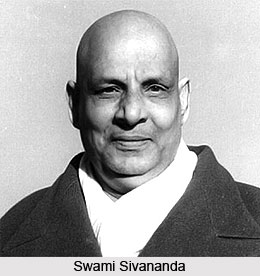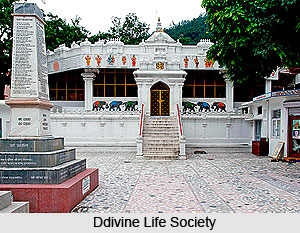 Swami Sivananda established the Divine Life Society in the year 1936, positioned at the right bank of River Ganga. He registered the Trust Deed at Ambala. The Headquarter of The Divine Life Society is located at Sivanandanagar on the banks of Ganga, at a distance of 3km from Rishikesh. This organization was registered in the year 1936 as a trust whose main objective is to propagate spiritual knowledge and selfless service of humanity. The publication of the `Divine Life Society` monthly journal started in September 1938 to coincide with the celebration of Swami Sivananda`s Birthday.
Swami Sivananda established the Divine Life Society in the year 1936, positioned at the right bank of River Ganga. He registered the Trust Deed at Ambala. The Headquarter of The Divine Life Society is located at Sivanandanagar on the banks of Ganga, at a distance of 3km from Rishikesh. This organization was registered in the year 1936 as a trust whose main objective is to propagate spiritual knowledge and selfless service of humanity. The publication of the `Divine Life Society` monthly journal started in September 1938 to coincide with the celebration of Swami Sivananda`s Birthday.
The Divine Life Society is an all-embracing and all-inclusive Institution. Its objects, ideals and aims are very broad and universal. It does not condemn any of the principles or tenets of any cult. It includes all the fundamental principles of all religions and cults. There are no pet dogmas or sectarian tenets. It leads people to the spiritual path. It enables people to take easily to the Divine Life even while living in the world and following the teachings of some particular cult or religion.
This organization has preserved the ancient traditions and cultural practices over the former years and today they stand out as time-honoured heritage. They preach morals to be unselfish for the welfare of humankind. This organization provides spiritual recreation to freshen up the educated minds of the people wherein one can refresh and renew his physical, mental and spiritual beings. The Divine Life Society was established for the dissemination of spiritual knowledge throughout the world and subsequently about 300 Branches were opened in all important cities. Thousands of students received initiation from Swami Sivananda into the order of Sanyasa in this institution.
Swami Sivananda believed in a blend of both the yoga as well as easing of the human sufferings by devoting oneself for the help of humanity. Swami Sivananda`s yoga practice which he called as the `Yoga of Synthesis,` is beneficial in the development of the head, hand and the heart through practicing the different forms of yoga known as the Karma Yoga, Jnana Yoga and the Bhakti Yoga.
Swami Sivananda`s remedies were inseparable from the allopathic treatments, not only then, but also in the past days when he resided in the Swarga Ashram. Thenceforth he started feeling that the human sufferings can be cured only by the means of authentic Ayurvedic medicines that can be prepared from the herbs that are rarely found in the Himalayas. He therefore institutionalized the Sivananda Ayurvedic Pharmacy in the year 1945. This institution has reached up to that peak of success where today it is unable to meet the increasing demands of the populace.
The Society has brought about a vigorous awakening throughout the world and has contributed much to a new life of freedom in action, a life of harmony amidst worldly turmoil and a life of bliss through mental non-attachment and mental renunciation of desires, egoism and mine-ness. There is universal appreciation of the principles, aims, and ideals of the society and the method of its work. It lays great stress on the practical side of Sadhana. It expounds in a rational and scientific manner the Yoga of Synthesis. The Divine Life Society proclaims that any man can attain Wisdom in his own station of life, be he a Brahmachari, Grihastha, Vanaprastha or Sannyasi, be he a scavenger, Brahmin, Sudra or Kshatriya, be he a busy man of the world or a silent Sadhaka of the Himalayas.
More than to strive to reach a Heaven after this life, the followers of the Divine Life try to make conditions of Heaven prevail upon earth. The tenets of the Divine Life Society are perfectly non-sectarian and universally applicable. The basis of this Movement is adherence to the triple ideal of truth, non-violence and purity which the common fundamental tenets of all the religions throughout the world. Therefore the Divine Life Movement has the willing cooperation of the peoples of all faiths and cultures, a Plan of Life and a Goal that is common and acceptable to all upon earth, who wish to rise above sorrow and obtain lasting Bliss. This, then, is the Divine Life Movement.
The small charitable dispensary that was commenced by Swami Sivananda has developed gradually and today is a regular hospital with X-ray and others such facilities. In the forthcoming years in December 1957, the Sivananda Eye Hospital was established; today the hospital has 22 beds for patients.
The Divine Life Society organization did not grow much wider; it was barely perceivable amidst the civic people. Today, it is the Headquarters of the world-wide organization having a large number of organizations both within and outside the country. Even, the Ashram is now in a position to maintain about 400 persons, learned and cultured scholars, Mahatmas, Yogins, devotees, poor people and the sick, not to mention the school students of the neighbouring villages.




















